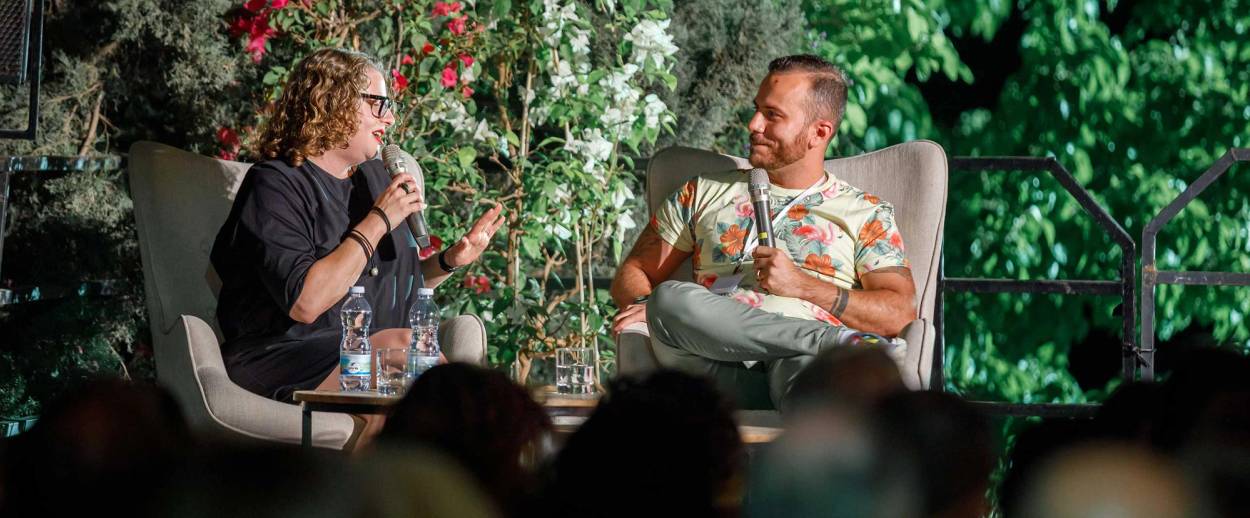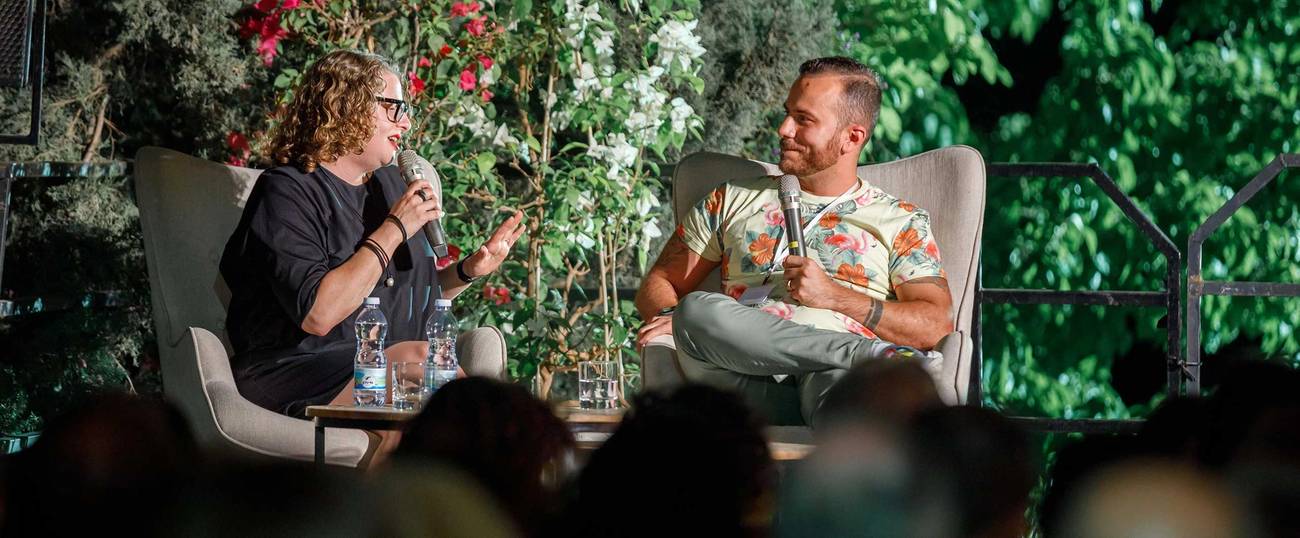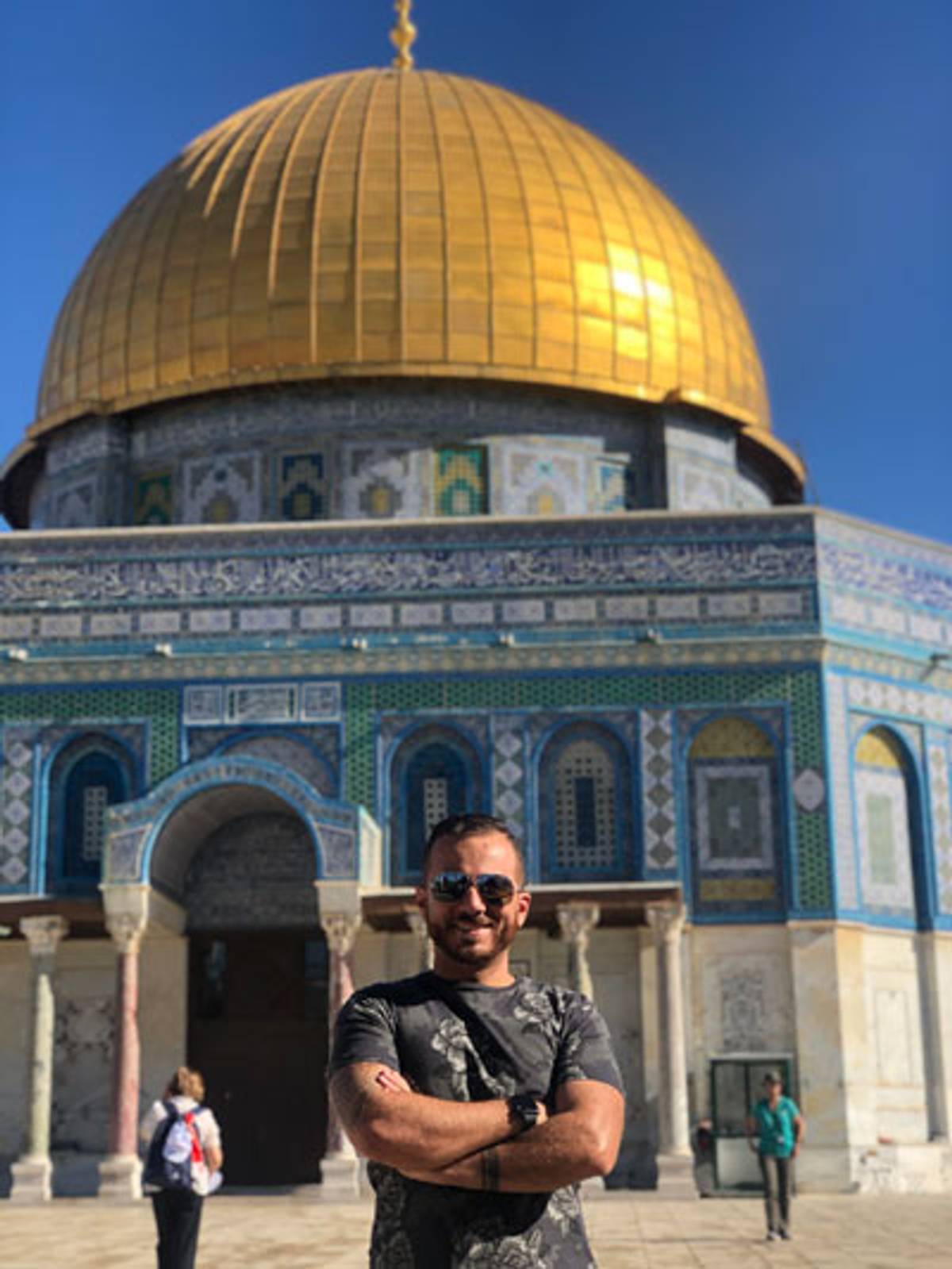A Syrian in Jerusalem
Finally face to face, after growing up learning about the other




Tel Aviv Airport, Saturday, May 11, 2019—“What is your origin?” the Israeli custom officer asks while examining me closely. My Canadian passport, still briskly new, states that information clearly, but he didn’t bother reading it.
“I was born in Damascus, Syria,” I respond, calmly. He pauses, as if he can’t hear me. He looks up and asks me to repeat myself.
“I was born in Damascus, Syria.”
The customs officer apologizes, insisting that he didn’t hear me well. He peers at me through the window.
“I was born in Damascus. Syria.” I say again, this time loudly, and silence falls behind me and my fiancé, Matthew. The other passengers must be cursing their luck; they picked the wrong line.
The officer takes away my passport and asks me to head to the security waiting room.
***
It’s 1998 and winter is cold in Damascus. My fingers are freezing even though I’m wearing the red wool gloves my father bought me last week. I wanted the pink gloves, but he instructed me that pink is a girls’ color and presented me with blue ones instead—dark like the skies of Damascus after a snowstorm. We finally settled on the red gloves as a neutral, genderless color.
The road to school is downhill. I walk it every day with my friend Iyad. We hold hands sometimes when we cross busy streets; it’s a habit we learned in our childhood that we will forget as we grow older, but for today, we are holding hands. He is wearing dark blue wool gloves.
We discuss the nationalism class we had yesterday. The teacher, an older woman we nicknamed Mrs. Storms due to her mood swings, insisted that the Zionist enemy occupying Palestine must be eradicated. “The only way to defeat them is to believe in Hafez al-Assad, our forever leader, who continues his stand against the Zionist enemy since he was elected in the 1970s.”
We believe Mrs. Storms, especially as she talks about the glorious events that led to Syria winning the October 1973 war against Israel. Iyad tells me that we should always fear the Zionist enemy because they’re monsters. “They kidnap Palestinian children and lock them in barrels,” he explains. I am distracted, looking deeply in his brown eyes and wishing that I could kiss him. “They drain them of their blood and make blood pies they eat on Saturdays.” I jolt out of my fantasy, scared. I squeeze his hand tighter.
That night, instead of the usual wet dreams about Iyad, I have a nightmare in which monsters with sharp teeth are forcing me down a barrel and draining my blood for pies.
***

Jerusalem, Sunday, May 12—“You’re avoiding the question,” the journalist sitting across from me says. He is covered in sweat; the weather in Jerusalem knows no mercy. He asks me for the third time to state my political view on the current Israeli affairs.
“I am quite critical of the State of Israel, and its violations of human rights specifically when it comes to Palestinians and illegal migrants,” I repeat, “but I’m not riding a much higher horse when I’m coming from Syria, with its own regime’s violations of human rights against its own people.”
He was still unpleased. “This is a polite answer,” he states, disappointed.
“This is the answer I have for you,” I insist. “I’m a writer here—coming to talk about my book, not the Israeli-Syrian tension.”
“You’re the first Syrian person that I interviewed in my life; you owe me answers about Syria,” he asserts. Sweat is building on my own forehead now. This interview started as a fluff piece about my writing and turned into 60 Minutes.
“How can you still love Syria after all it did to you? How can you not just admit that Israel is better?” he asks, making sure his recording device is still working.
I’m genuinely unsure how to answer this question. I believe in the complex narrative of our geographical location, and I believe in the complex experience of my life. Syria is an insane mother; she gave me birth and nurtured me, and she abused me as a child and slammed the door in my face. The package of love and hate I have for her is mixed within me. The complexity of my relationship to this mother taught me one thing: Things are never black-and-white; everything is a shade of gray. The worst thing we can do is simplify our hate for one another, I truly believe that—it makes it easier for us to forget how complex the human experience is not just for others, but also for ourselves.
Yet simply enough, I hate this journalist. I look at him in disdain and I decide to answer all of his future questions with yes or no answers.
***
It’s 2005 and it’s hot in Dahab, a little town on the beaches of the Red Sea. My boyfriend at the time, an Italian man with brown hair and skin that glows under the sun, introduces me to his Israeli friend visiting for the weekend. We spend the evening smoking joints and drinking wine while chatting about the world and I realize, for the first time in my life, that Syria did not win the October 1973 war. My friends—most of them are American or European—make fun of me and I explain that I grew up with that being taught in schools as a historical fact. Everyone goes to bed, and I spend the night researching the historical events of the tension between Syria and Israel and I realize that al-Assad used the narrative of “The Zionist Enemy” to create a boogeyman for the Syrian people, to convince us that he was the only one who could protect us from that monster. I connect the dots and realize that Iyad was only recounting a scene from The Mummy when he told me the story of the blood pies. That is the day I learn about the anti-Jewish riots in Syria. Mrs. Storms never taught us anything about that.
***
Jerusalem, Thursday, May 16—“I remember crying my eyes out when I found out that it is a boy,” a woman in the little bar we’re at with my fiancé says to me. I can tell that she has tears in her eyes as she speaks. She downs the remaining red wine in her glass and smiles at me. Behind her face I see emotions that I couldn’t understand. She already told me of her joy that she finally got pregnant after trying for months, she told me of the many trials her and her husband went through for that pregnancy to be successful.
“You cried of happiness, I assume?” I question. I can picture her in her hospital bed when the doctors revealed to her that her child is a boy. Both of the parents decided not to know the gender of the child until the delivery day. She sniffles and looks around the two of us, the lights dimming, and the breeze engulfing us with a chill. “No,” she states. “I cried because I knew he will end up going to the army as a fighter.”
She looks around her again. “The Israeli Defense Forces are creating monsters of our children,” she whispers. “The propaganda is intense, and I don’t know. We don’t know if we can raise our child strongly enough to educate him on the world around him. We don’t know if we can prepare for the years he will spend in the army, carrying weapons and wielding power in the face of the other.”
She looks around her one more time. The lights at the bar are at the dimmest they could be. Somehow, I feel like the two of us are finally alone in the bar. “We grew up learning about the other,” she continues, “the Arabs who want to kill us and eradicate us and push us to the sea. It took us years to come up with our own truths, and I’m scared.”
And then she adds with a sigh: “I’m scared he will hate you even before he knows you.”
***
It’s 1947 and I am not yet born. Syria has gained independence from the French less than a year ago, and nationalist voices are taking hold. The country is drawn on the map like a misshapen triangle. The last time Syria was independently ruled was in the seventh century, before the Islamic armies coming from the Persian Gulf colonized this land we now call Syria. This new concept of what it means to be Syrian is growing, and the United Nations voting in favor of partitioning Palestine leads to persecution of the Jewish minority in Syria. Anti-Jewish riots in Aleppo and Damascus erupt. Suddenly a minority that has been part of these communities for 2,000 years becomes the enemy. Seventy-five people are murdered, Jewish houses and businesses set ablaze. In 1947, 10,000 Jewish people live in Aleppo. By 2012, not a single Jewish person lived in the whole country of Syria.
***
It’s 2015 and it is raining in Vancouver. It seeps into my clothes and my bones no matter how many layers I put on. My feet are always freezing and wet. I open my email to finally receive the results of my 23andMe test. I scan the percentages. I knew most of these things: I have Assyrian blood in me, carried in my genes since 600 BCE, I’m 25% Kurdish from my mother’s side, and I have some Italian blood that my family tree can’t explain. Right there, I knew that I’ve always belonged to that part of the world, and I started to realize that the Arabs were colonizers themselves, bringing the Islamic religion, the Arabic language and erasing the Assyrian identity over hundreds of years. I feel pride in my history as an Assyrian, a history I never learned about in high school. Two years later I will be in Paris, visiting the Louvre, and I will find myself in a special exhibit of Assyrian heritage. My boyfriend will take a picture of me next to one of the Assyrian statues and he will say that the statue and I share the same eye bridge and nose. I won’t let him see, but I will be so moved, I will cry.
***
It’s 2019 and the curtains are closed. I don’t know what the weather is like outside, but it changes six different ways throughout the day in Vancouver’s spring season. I announce on Facebook that I will be visiting Israel for the International Writers Festival in Jerusalem and I immediately start receiving comments from friends. Most are celebratory, but a couple of them voice disappointment. The tension between Syria and Israel jumped to new levels when President Donald Trump tweeted his intention earlier in March to recognize Israeli control over the Golan Heights, a territory that Israel wrestled from Syria in the Six-Day War in 1967. Others accuse Israel of so-called pinkwashing, or vocally supporting the LGBTQ+ community to wash away alleged state human rights violations against Palestinians. One person I admire texts asking me, as a fellow artist, to boycott Israel.
When I received the invitation to visit Israel over a year ago, I thought about all of these accusations. Before that, when my Israeli publisher asked me if I would be interested in publishing a Hebrew translation of The Clothesline Swing, I asked myself these same questions, too. I decided back then, as I’m deciding now, that the history of tension between Arabs and Israelis is more complicated than today’s headlines or yesterday’s wars. Our history is a complex story with multiple viewpoints, and multiple narratives. Each side continues to write their own narrative, winning wars on history papers and creating enemies of other people we never met. My relationship as a Syrian with Israel is narrated through propaganda and media headlines. I’ve never met someone like me visiting a place like this. I’m running this course without any guidelines other than my values.
I do not want to be part of the herd mentality of rejecting the other. I want to be able to see the more complex—albeit incomplete—picture of what it truly means to carry all of these identities, and to hold such privileges, while visiting such a complex place.
Here is the thing: The simple act of me flying with my fiancé to Israel for a week is more complicated than just how simplified all of these narratives are. It’s larger than all of these little and large stories I share, it’s the sum of all of these parts. It’s also an experience that I’m the first person to ever go through—to my knowledge, at least—as the first Syrian Canadian author to visit Israel and one of the few Damascus-born people to ever have the opportunity to visit modern Jerusalem.
***
Tel Aviv, Sunday, May 19—I reach my hand over a man’s head. “Excuse my reach,” I say in English, trying to fetch a book on the shelf over his seat in a bookshop café.
He doesn’t acknowledge me.
I repeat the same thing in Arabic, and check to see if he is wearing headphones. I don’t want to reach over his head without permission. He still is gazing, almost aimlessly, at his laptop screen. I can tell he is not acknowledging my presence. “Which book do you want?” the bookshop owner, an Arab Israeli sitting in the corner, stands up and grabs the book I’m pointing at. He asks the man sitting down in Arabic to move a bit, and the man moves smiling. The man then turns to me and gives me a dirty look. I think about asking him why he is antagonistic toward me. I think better of it, and walk back to my table, and hand the book—an English translation of Azazeel by Yousef Zaydan—to my partner. I wanted my fiancé to read a book I read when I was much younger, in Arabic.
I sit down, glancing at the man every now and then, meeting his accusing eyes.
“We heard about your visit,” the bookshop owner says to me as I pay for the 13 books—12 of which are in Arabic—and for our tea. “We read about you in the newspaper.” He glances with me toward the man in the corner. I smile and we exchange some pleasant chitchat about how expensive it is for me to cargo books in Arabic from the Middle East to Canada, and how meaningful it is for me to browse a bookstore with Arabic books.
“You shouldn’t have come here,” the man under the shelf says, under his breath as I start leaving the bookstore. I look at him, and I don’t comment. I don’t know why I feel the way I feel, but I walk out of the shop feeling somehow ashamed, as if I committed a crime without intention. I walk quickly away from the bookstore, squeezing Matthew’s hand.
***
It’s Tuesday early morning and I am walking the old city of Jerusalem. Matthew and I avoid the harsh sunrays filling the old streets. We stand by the Dome of the Rock, and I find myself unlayering the city around me. Each stone has its own narrative. I feel that in my bones. I feel it within the way I layer my own identities. My body is one but there are so many layers within it: my Syrian-ness, my Canadian-ness, and my queerness to name a few. This city is a living body within itself and its heart is beating. I can hear it. It is beating. I can feel it.
***
You can help support Tablet’s unique brand of Jewish journalism. Click here to donate today.
Ahmad Danny Ramadan is the author ofThe Clothesline Swing. He lives in Vancouver, Canada.